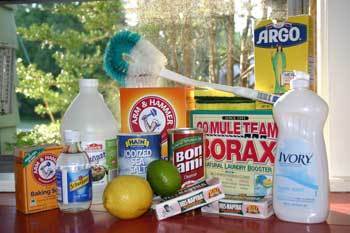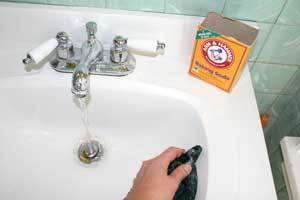
If you're like me, one trip down the cleaning products aisle at your local grocery store can leave your eyes burning, your head pounding and leave you gasping for fresh air. Making your own green cleaning supplies is not only better for your indoor and outdoor environment and your health; it can save you a bundle of money. On average, $20 dollars of commercial cleaners will cost you less than $5 to make.

Mix and use in a spray bottle.
Tile and Linoleum: Mop with 1-2 teaspoons of dishwashing soap dissolved in 3 gallons of warm water. Rinse with a mixture of 1 cup white vinegar and 3 gallons water.
Sinks and Counters: Baking soda or Bon Ami makes a great scouring powder to clean or "bleach" refrigerators and shelves, coffee pots, cookware, wooden cutting boards, stainless steel, and plastic dishes.
Oven: Sprinkle the inside with warm water and baking soda. Let stand overnight and scrub with a moist pad. Also try salt or white vinegar.
Dishes: Pour 1 Tbsp of borax in the rinse dispenser for an alternative to dishwasher detergent. Use Seventh Generation, Palmolive, or Ivory dish soaps for hand washing dishes. Sprinkle burned pots and pans with a generous portion of baking soda and a small amount of water and let stand for several hours before scrubbing.

Shower Curtains: Wash them in the washer with a towel. Add in 1 cup of vinegar to the rinse cycle and hang or briefly tumble dry.
Soap Scum on Chrome Fixtures: Pour on undiluted vinegar and let stand for 5 minutes. Rinse with water and repeat as needed.
Lime Deposits: Soak showerheads and faucet parts in vinegar overnight.
Glass Cleaner: 1/4 cup vinegar in 1/2 gallon of water. Use a spray bottle to apply and wipe with newspaper. A great alternative to this mixture is plain club soda.
Clogged Drains: Use a generous amount of baking soda followed by a cup of white vinegar. Expect to see white foam. Flush with hot water and repeat as necessary.
Rust Remover: Sprinkle a little salt on the rust and squeeze a lime over the salt until it's thoroughly soaked. Let it stand for 2-3 hours and use the leftover rind to scrub it off.
General Stains: Soak in borax and water.
Cola, Wine & Ketchup Stains: If clothing is 100% cotton or a cotton-poly blend, sponge with diluted vinegar within 24 hours. Wash normally.
Deodorant and Antiperspirant stains: Rub with white vinegar before washing.
Bleaching: Use non-chlorine bleach.
Fabric Softener: Add 1/2 cup of vinegar and 1/2 cup of water in rinse dispenser.
For light loads use 1 cup, for full or heavily soiled loads use 2 cups. Tips: If you can't find Fels Naptha soap (made by DIAL soap) in your area, Ivory bar soap flakes or Octagon Soap are good alternatives. Washing soda is not the same as baking soda - DON'T substitute. Look for Arm & Hammer Super Washing Soda in the supermarket detergent isle.
Woodwork: Use all purpose cleaner.
Wood Floors: Use 1/2 cup of vinegar per gallon of water. Wipe dry.
Walls: Baking soda will remove scuffmarks.
Carpet & Rub Stains: Blot spill immediately. Sprinkle with baking soda, cornstarch, or borax and let dry. Wash with club soda and vacuum.
Furniture Polish: Mix one part white vinegar and three parts olive oil. Add a small amount of natural lemon oil.
Upholstery: Sprinkle on cornstarch and vacuum to freshen up and remove minor dirt.
Copper & Brass: Saturate a sponge or towel with vinegar or lemon juice and salt. Lightly rub, rinse, and dry.
Recycled Scrubbing Pads: Try old balled up panty hose or a half a used lemon sprinkled with salt.
If your store doesn't stock them, let the manager know you want them to carry environmentally friendly products. Until they do, keep the following in mind:
Read labels carefully. By law, toxic chemicals need to carry one or more signal words: Danger, Poison, Warning, Caution. Look for products containing non-petroleum based surfactants, and those that claim to be non-toxic, biodegradable, and are free of chlorine and phosphates.
Don't buy products containing ammonia or chlorine (usually found in scouring powders, dishwater detergents, bathroom cleaners, and laundry bleach). These two chemicals cause health problems and damage the ozone.
Stay away from traditional toilet bowl cleaners, oven cleaners and furniture polish. These contain the highest amounts of toxic chemicals.
Buy non-chlorine bleached paper products. The process of bleaching paper releases dioxin, a known carcinogen, into the atmosphere. Buying paper products labeled "non-chlorine bleached" will help cut down on dioxin pollution.
About The Author: Ellen Brown is an environmental writer and photographer and the owner of Sustainable Media, an environmental media company that specializes in helping businesses and organizations promote eco-friendly products and services. Contact her on the web at http://www.sustainable-media.com
Add your voice! Click below to comment. ThriftyFun is powered by your wisdom!
Are these cleaners safe for septic tanks?
I love your list but it would cost me at least $20 to buy all the products listed above and I'd still have to store the portions not used in cleaning mixes.
I buy one product for everything: soap. I use old t-shirts, diapers, or towel pieces for rags. Add hot water for greasy messes and room temperature water for everything else and VIOLA!, it's all clean! If you soak pans, you only need to scrub lightly with an onion bag "scrubber" with no additional product. If you wipe down the bathroom sink and bathtub walls once a week, there's no gritty, grimy stuff so you don't need the Bon Ami (which I do love, but don't need).
Our grandmothers didn't use even these more natural and basic items because they cleaned regularly and simply didn't need them.
I use soap for dishes, laundry, cleaning. Sometimes a liquid and sometimes a bar, depending on what's most convenient at the time. The liquid Ivory costs about $2 a bottle and lasts a couple of months if used for everything because I dilute it in half. The only additional products we buy are toothpaste and shampoo for personal hygeine. The simpler, the better for me.
But these are such excellent alternatives for those who need a few more touches than we do. Thanks for posting them.
Can you use the concentrated bottled lemon juice or does it need to be a fresh lemon?
While your recipe for laundry detergent is correct, the amount to use as a dry detergent is one tablespoon not one cup as you indicated. If you are making it into a liquid laundry detergent, then a cup full would be appropriate. Here is a link for making the liquid www.homeschoolblogger.com/
Hope this helps.
Trish
Just want to tell you how handy this page is! I made a copy for my mom and me to keep. I told her how great the baking soda and vinegar are for clogged drains. My bathtub drain was awful but a few baking soda/vinegar treatments did it a world of good. I love cleaning this way! Thanks again.
Cindy M
Thanks! I'm trying to switch over when I can to more environmentally friendly stuff. We've always used vinegar and I've tried the commercial stuff sometimes, only to make myself sick with the smell, literally on the floor woozy sick!
Vinegar is a better choice to clean wood cutting boards and all surfaces in the kitchen, including appliances. Anything powdered requires a lot of rinsing to remove the dry powder residue. Keep a spray bottle of straight white vinegar on hand for the constant daily jobs, it is an excellent disinfectant. I don't use Bon Ami for stainless steel sinks, baking soda is non-scratch. I have had terrible luck using borax or washing soda in dishwashers because they don't dissolve. Instead I use cheap dishwashing detergent in one cup and baking soda in the other. The floor cleaning recipe for tile or linoleum is too long and hard and the rinsing is endless. 1/4 cup of Murphy's oil soap and 1/2 cup of white vinegar is quicker and leaves no residue. Try using less Murphy's if your floor is small.
The all-purpose cleaner has huge flaws, way too much soap, oils. 1/4 of liquid detergent is way too soapy for one thing. This recipe is tried and true from "Annie's" Care2.
All-Purpose Cleaner [Just like Fantastic, only safe!]
1/2 tsp. washing soda
1/2 tsp. liquid soap
2 tsp borax
2 cups hot water
A few drops of essential oil...your favorite
Pour into spay bottle and shake.
You will buy borax and washing soda once and it should last forever as you do not need much in most recipes!
Add your voice! Click below to comment. ThriftyFun is powered by your wisdom!